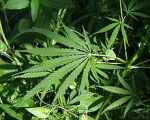Hemp, or cannabis, or marijuana (a word invented by corporation) was outlawed in 1937 because it was a threat to corporate interests. One was a paper manufacturer who also had a newspaper and acres of timber. His paper chain wrote scathing stories against “marijuana”, which was a word he made up. He knew no one would believe them about hemp since it was grown by many in that day, even by George Washington.
A newly invented state-of-the-art hemp harvester, the decorticator, lead Popular Mechanics magazine to refer to hemp as the New $Billion Crop. Because of printing and bindery lead time required for publication, this Feb ‘38 article was prepared in the Spring of ‘37 when it was an incredibly fast-growing industry. Newsprint could now be produced far more cheaply than any other method, and with 1 acre producing as much newsprint as 4 acres of forest trees. The paper producer, Hearst, owned vast timber acreage and competition from the hemp industry might have driven his paper manufacturing out of business.
- Dupont owned the patent for converting wood pulp into newsprint and supplied the necessary chemicals.
- In the ‘30s, DuPont was gearing up to introduce nylon and other man-made fibers, along with synthetic petrochemical oils which would replace hemp seed oil used in paints and other products.
Schlichten spent 18 years and a large amount of money on the decorticator, a machine that could strip the fiber from plants leaving the pulp behind. His desire was to stop the felling of forests for paper, which he believed to be a crime! The decorticator meant that hemp fibers could be manufactured as fine as any man-made fibers. A loss of untold millions of invested dollars was in store, plus an estimated 80% of all future business, unless hemp was outlawed, therefore, this competition was too costly. Cannabis hemp was the world’s largest agricultural crop for thousands of years, used in thousands of products and enterprises, producing the majority of fiber, fabric, lighting oil, paper, incense, medicine and food.
Industrial hemp is produced in many countries around the world. While more hemp is exported to the United States than to any other country, the U. S. does not consistently distinguish between marijuana and the non-psychoactive Cannabis used for industrial and commercial purposes.
Media Manipulation
Cannabis hemp was prohibited to protect the Hearst and DuPont corporations from devastating competition, as well as appealing to the overt racism stirred up by Hearst’s newspapers. A media blitz of journalism raged in the late 1920s and ‘30s as his papers ran stories emphasizing the horrors of marijuana, portraying it as such a menace it made headlines. The purpose of all that was solely to gain public support to get anti-marijuana laws passed . If the news was in print or on the radio, the masses believed it had to be true and that info got passed along to their children of whom grew up to be the parents of the baby-boomers.
Few people at the time realized that the deadly menace they had been reading about on the front pages was in fact passive hemp and, therefore, in Sept of ’37 it became illegal. The most useful crop known suddenly became outlawed as a violent drug and our planet has been suffering ever since. A large variety of food products can be generated from hemp. The seeds contain one of the highest sources of protein in nature and have two essential fatty acids (EFAs) that detoxify cholesterol. These EFAs are not found anywhere else in nature!
Today our planet is in desperate trouble, suffocating as large tracts of rain forests disappear. Pollution, poisons and chemicals are killing people and one huge change that can reverse these problems is to simply industrialize hemp. Natural biomass could provide all of the planet’s energy needs that are currently supplied by fossil fuels. We need a renewable resource and hemp could also be the solution to the soaring gas prices.
Hemp has a higher quality fiber than wood fiber and far fewer caustic chemicals are required to make paper from hemp than from trees. Hemp paper does not turn yellow and is very durable. The plant grows quickly to maturity in a season as compared to a lifetime(s). All plastic products should be made from hemp seed oil as hempen plastics are biodegradable and therefore, not harmful to the environment. Oil-based plastics, the ones used today, do not break down and will do great harm in the future. The process to produce the vast array of natural hempen plastics will not cause harm to our rivers.
